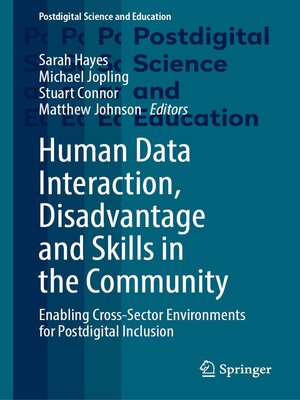Human Data Interaction, Disadvantage and Skills in the Community
ebook ∣ Enabling Cross-Sector Environments for Postdigital Inclusion · Postdigital Science and Education
By Sarah Hayes

Sign up to save your library
With an OverDrive account, you can save your favorite libraries for at-a-glance information about availability. Find out more about OverDrive accounts.
Find this title in Libby, the library reading app by OverDrive.



Search for a digital library with this title
Title found at these libraries:
| Library Name | Distance |
|---|---|
| Loading... |
The book provides a dynamic, cross-sectional, multidisciplinary perspective and dialogue to illuminate the challenges humans face in their interactions with data in their individual postdigital contexts in local communities. It offers unique insights from real cases, collaborations, and projects to extend existing academic theories and frameworks, applied to human data interactions, disadvantage, and digital skills. The book takes the novel approach of establishing co-authorship between cross-sector practitioners from the wider community (such as local authorities, councils, policy makers, small businesses, charities, education and skills providers, and other stakeholders) with international academics and researchers who write about humans, digital skills, and data. This develops an enabling cross-sector environment throughout the book that not only furthers broader understandings concerning data, disadvantage and digital skills in postdigital society, but also shares a template to support others who may wish to adopt this approach to co-authorship and knowledge exchange.
The book revisits the Human Data Interaction (HDI) framework (Mortier, Haddadi, Henderson, McAuley, and Crowcroft 2014) through many diverse cross-sectoral perspectives. These are co-authored under the HDI framework's key tenets of: agency, legibility, negotiability and resistance. These tenets form the main sections of the book, with chapters examining these concepts through both interdisciplinary academic literature and cross-sector dialogue with individuals and agencies from the wider community who work with diverse and often disadvantaged groups.







